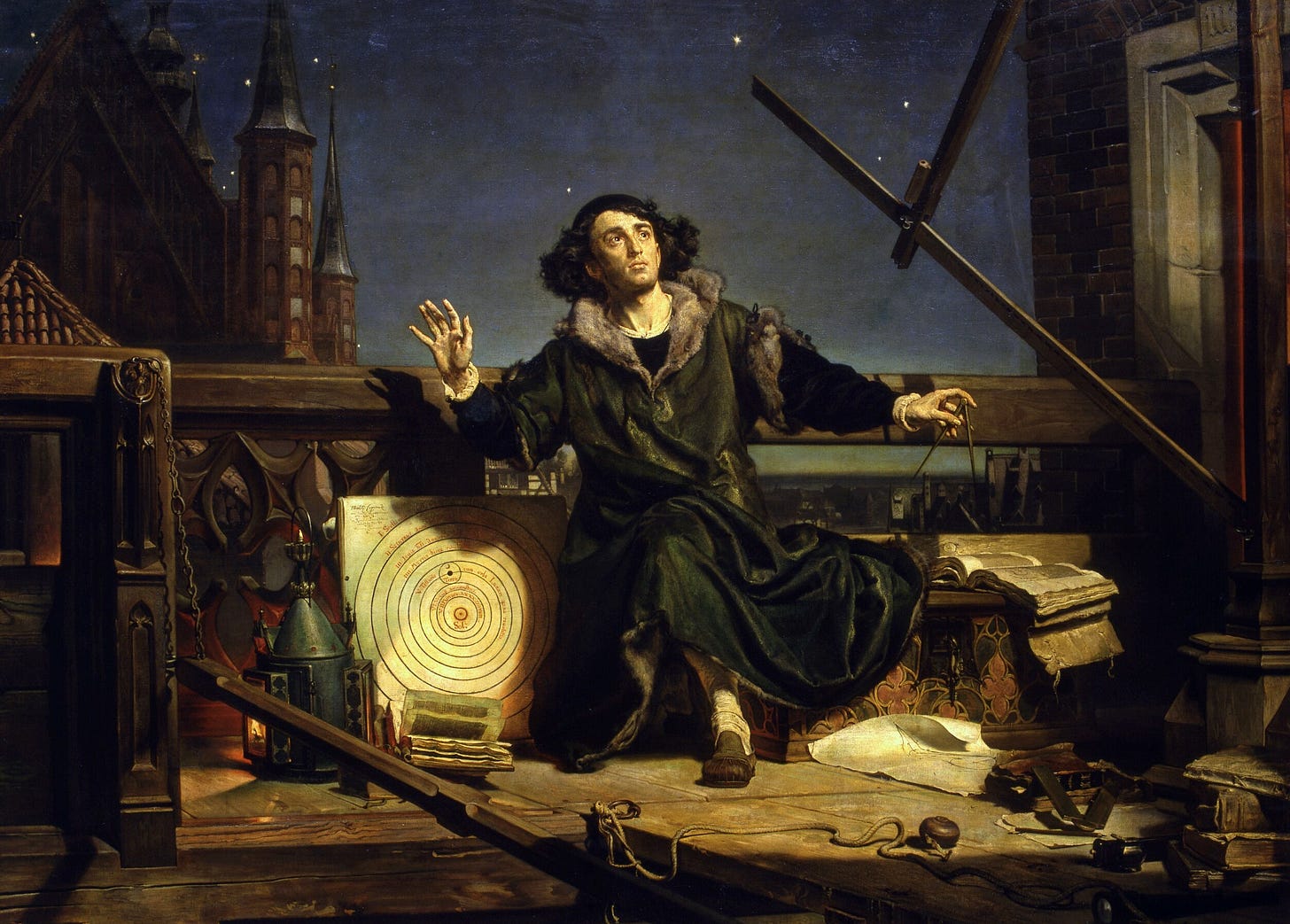Comrades,
I was invited to speak at a conference dedicated to the work of Lee Smolin in Waterloo (Canada) on June 5 2025:
Lee's Fest: Quantum Gravity and the Nature of Time.
Below, a text of this speech,
As always, if you have the means and value writing that both enriches and disturbs, please consider becoming a paid subscriber.
(Picture: Astronomer Copernicus, or Conversations with God by Jan Matejko, 1873)
Subscribe now
Share
What am I, a philosopher, doing here, where specialists will debate features of quantum gravity well beyond the scope of my understanding? From its very beginnings, it was clear that quantum mechanics (QM) has earth-shattering implications for our notion of reality. However, although there were speculations here and there, the predominant stance until recently was Copenhagen orthodoxy: “Don’t think, just calculate!” In the last decades, ontological questions have exploded. At the very beginning of his bestselling The Grand Design, Stephen Hawking triumphantly proclaims that “philosophy is dead.” With the latest advances in quantum physics and cosmology, so-called experimental metaphysics has reached its apogee: metaphysical questions about the origins of the universe, the nature of space and time, etc.—which until now were the topic of philosophical speculation—can now be answered through experimental science and thus, in the long term at least, empirically tested. However, things are not as simple as that. Many quantum scientists are now aware that they should be raising proper philosophical questions (for example: What is the nature of quantum waves? Do they form a reality separate from our common material reality, or are they just instruments of calculation?).
Following these debates as an outsider, I noticed that many quantum physicists have taken refuge in esoteric spiritualism or direct subjective idealism. Here is a typical comment: “Do paradoxes like this really echo ancient philosophies like Advaita Vedanta, which say separateness is an illusion and everything is connected? Quantum entanglement reveals particles can remain linked across vast distances, as if part of one indivisible whole.” Even Roger Penrose wrote at some point that “Somehow, our consciousness is the reason the universe is here,” not to mention Zeilinger, who links QM to Tibetan Buddhism. No wonder that many obscurantist philosophers join them in this endeavour—for them, the quantum collapse is an act of free conscious decision.
Lacan knew what he was saying when he claimed that quantum mechanics is the first science that deals with the Real—the Real as distinct from the symbolically constituted reality. The whole point of quantum mechanics is that there is another level of being which obeys laws different from our ordinary reality: the Real of quantum waves, of quantum superpositions that collapse into our reality. This level is indeterminate but still deterministic; the probability of a collapse is governed by the very precise Schrödinger equation. At this quantum level, our standard notion of time and space as universal containers of all reality must also be abandoned.
To interpret this quantum domain as the final refutation of materialism and as proof that reality is spiritual succeeds only if we restrict ourselves to the classic deterministic notion of reality—small material particles jumping around in all-encompassing space and time. Furthermore, the role of observation is far more complex: experiments confirm that a collapse occurs when a quantum process is "observed" by a measuring device, even with no conscious awareness whatsoever.
Those who claim there is no reality outside consciousness dismiss as a pseudo-problem the most philosophically intriguing aspect of quantum mechanics: the exact ontological nature of quantum waves, their collapse, and the retroactive causation implied by such events. So you, quantum scientists, need philosophy, but you should not trust philosophers who appropriate your work for obscurantist purposes.
Here enter people like Lee and the entire gang around him, from Francesca Vidotto and Carlo Rovelli to Julian Barbour and Sean Carroll. Like me, they remain materialists, although they are well aware that the notion of materialism has to be radically rethought after quantum physics. So what does materialism mean here? Not that the ultimate reality is empty space with small elements floating in it, but something much more interesting. Einstein’s full determinism relies on a religious foundation—he wrote: "Raffiniert ist der Herrgott, aber boshaft ist er nicht." (God is subtle, but he is not intentionally deceiving us). Although Einstein repeatedly pointed out that he didn’t believe in a personal god, he proclaimed himself deeply religious: "I believe in Spinoza’s God, who reveals himself in the harmony of all that exists.” In this sense, for him, religion and science necessarily coexist: science itself is sustained by the deep faith that our universe is marvellously arranged in a harmony that pervades all that exists. I think it is this very belief which has been dealt a mortal blow by quantum mechanics. For me, quantum mechanics implies an inconsistent, plural world not grounded in any big foundation, even if this foundation is the Void itself.
Read more




